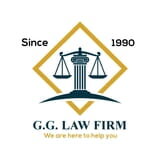Best Truck Accident Lawyers in Kavala
Share your needs with us, get contacted by law firms.
Free. Takes 2 min.
List of the best lawyers in Kavala, Greece
About Truck Accident Law in Kavala, Greece
Truck accidents in Kavala, Greece, often involve complex legal issues due to the size of commercial vehicles, their regulatory requirements, and the potential for serious injury or property damage. The legal process encompasses both civil and criminal aspects, such as compensation for injuries, determination of liability, and compliance with strict transportation and safety regulations. In Kavala, as in the rest of Greece, truck accident law combines national traffic legislation with specific provisions for commercial vehicles, making legal navigation after an accident particularly challenging for those unfamiliar with the system.
Why You May Need a Lawyer
There are several scenarios in which individuals involved in truck accidents in Kavala should strongly consider legal representation. These include disputes about liability, severe injuries or fatalities, insurance claim denials, significant property damage, and involvement with commercial trucking companies. Truck accidents often result in complicated investigations due to factors such as multiple parties, international trucking firms, involvement of hazardous materials, and the need for expert analysis. A lawyer can help with negotiating settlements, representing in court, liaising with insurance and transport authorities, and ensuring that victims receive due compensation for medical costs, lost wages, and suffering.
Local Laws Overview
Greece’s Road Traffic Code ("Κώδικας Οδικής Κυκλοφορίας") governs most truck accident cases in Kavala. Key elements include:
- Obligation of all parties to notify the police and insurance companies immediately after a serious accident
- Strict regulations for truck drivers, including licensing, allowed driving hours, and periodic vehicle inspections
- Presumption of liability may shift depending on adherence to speed, signage, and cargo safety regulations
- Victims have the right to claim compensation from the at-fault party’s insurance for injury, loss, or damage
- Deadlines for submitting claims and lawsuits are set by national limitation periods, usually within five years
- In cases involving foreign trucks, European Union laws on cross-border road transport may also apply
Engaging local police and obtaining an accident report is critical, as Greek courts and insurers heavily rely on these official documents.
Frequently Asked Questions
What should I do immediately after a truck accident in Kavala?
You should ensure everyone's safety, call emergency services, notify the police, collect witness and driver details, and document the scene with photos. Seek medical attention even for minor injuries.
Who is typically liable in a truck accident?
Liability depends on factors such as driver negligence, vehicle conditions, and regulatory compliance. The truck driver, trucking company, or even third parties may be held responsible.
Do I need to report a truck accident to the police?
Yes, reporting is mandatory in Greece for all traffic accidents involving injury, death, or significant property damage. Police documentation is crucial for insurance and legal claims.
How long do I have to file a legal claim after a truck accident?
In most cases, you have up to five years to file personal injury claims. Consulting a lawyer as soon as possible is advised, as specific circumstances may alter deadlines.
What compensation can I claim after a truck accident?
You may claim for medical expenses, lost wages, pain and suffering, property damage, rehabilitation costs, and in some cases, future loss of earnings.
Does insurance cover all damages in truck accidents?
Insurance should cover damages as outlined in the at-fault party's policy, but disputes on coverage scope or claim denials are common, highlighting the benefit of legal assistance.
What happens if the truck is owned by a foreign company?
International and EU laws may apply, affecting liability and claims processes. Specialized legal help ensures compliance and maximizes your access to compensation.
Can I settle my case without going to court?
Many truck accident cases are resolved through negotiations with insurance companies or mediation. A lawyer can help you obtain a fair settlement out of court.
What evidence is important in a truck accident case?
Police accident report, medical records, photos of the scene, witness statements, driver logs, and vehicle inspection reports are crucial forms of evidence.
How much does it cost to hire a lawyer for a truck accident in Kavala?
Costs vary depending on the complexity of the case and the lawyer’s fee structure. Some lawyers offer initial consultations at no cost or work on a contingency basis.
Additional Resources
Residents of Kavala seeking information or assistance after a truck accident can consult the following resources:
- Greek Police (Traffic Department of Kavala) - for accident reports and case documentation
- Ministry of Infrastructure and Transport - for licensing, vehicle regulations, and safety standards
- Greek Ombudsman (Synigoros tou Politi) - for mediation and citizen rights protection
- Local Bar Association (Dikigorikos Syllogos Kavala) - for referrals to qualified attorneys
- Greek Motor Insurers’ Bureau - for accidents involving foreign vehicles or uninsured parties
Next Steps
If you have been involved in a truck accident in Kavala, your first priority should be to seek medical help and notify the authorities. Gather and preserve all available evidence, such as police reports, photographs, and medical documentation. Avoid discussing fault or making statements to insurance representatives without first consulting a lawyer. Look for an attorney experienced in traffic and truck accident law in Kavala to discuss your case. You can contact the local bar association for recommendations. Initiate the legal process as soon as possible to maximize your chances of securing fair compensation and protecting your rights.
Lawzana helps you find the best lawyers and law firms in Kavala through a curated and pre-screened list of qualified legal professionals. Our platform offers rankings and detailed profiles of attorneys and law firms, allowing you to compare based on practice areas, including Truck Accident, experience, and client feedback.
Each profile includes a description of the firm's areas of practice, client reviews, team members and partners, year of establishment, spoken languages, office locations, contact information, social media presence, and any published articles or resources. Most firms on our platform speak English and are experienced in both local and international legal matters.
Get a quote from top-rated law firms in Kavala, Greece — quickly, securely, and without unnecessary hassle.
Disclaimer:
The information provided on this page is for general informational purposes only and does not constitute legal advice. While we strive to ensure the accuracy and relevance of the content, legal information may change over time, and interpretations of the law can vary. You should always consult with a qualified legal professional for advice specific to your situation.
We disclaim all liability for actions taken or not taken based on the content of this page. If you believe any information is incorrect or outdated, please contact us, and we will review and update it where appropriate.









